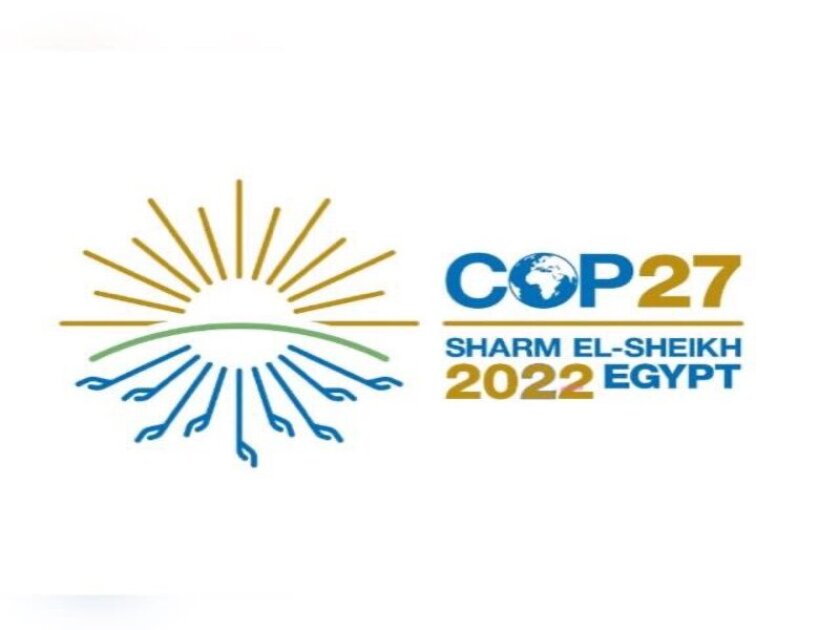The credibility problem surrounding climate pledges and net-zero financing has a clear solution: more implementation, more accountability, and more transparency, according to COP27 leaders.
The emphasis on implementation was reflected clearly in the conference’s slogan: “together for implementation” as well as in the opening speeches of its leaders.
“Today a new era begins, and we begin to do things differently,” said Simon Stiell, UN Climate Change Executive Secretary. “Paris gave us the agreement, Katowice and Glasgow gave us the plan, Sharm el-Sheikh shifts us to implementation.”
He stressed the importance of “holding people to account, be they presidents, prime ministers or CEOs, because our policies, our businesses, our infrastructure, our actions, be they personal or public, must be aligned with the Paris Agreement and the convention.”
He outlined three critical lines of action. Firstly, actors must demonstrate the shift to implementation, by putting negotiations into action. Second, actors must cement progress on mitigation, adaptation, finance, and, crucially, loss and damage. Thirdly, the principles of transparency and accountability need to be enhanced throughout the implementation process.
UN secretary general Antonio Guterres said the world is on a “highway to climate hell and our foot is still on the accelerator”. In addition to more effective action and accountability, crucially, there also needs to be an “historic climate solidarity pact between developed and developing economies” in which all countries make an “extra” effort to reduce emissions in line with the 1.5 degrees goal.
Climate justice - especially the responsibility of rich countries, who have benefited most from carbon emissions, to help the poor countries - is one of the hottest topics at COP27. Mia Mottley, prime minister of Barbados, for example, said the rich world had achieved its prosperity at the expense of the poor in times past, and now the poor were being forced to pay again, as victims of climate breakdown that they did not cause.
Guterres issued a stark reminder that around 3.5 billion people live in countries highly vulnerable to climate change and that progress needs to be made on adaptation. “In Glasgow, developed countries promised to double their contribution between now and 2025,” he said. “We need a roadmap for implementation.” Half of climate change funding “must be focused on adaptation”. Financial institutions and global development banks need to “change their economic models, boost adaptation models and serve as tools to lever more resources for climate changes”.
“The deadly impact of climate change is here and now, and loss and damage can no longer be swept under the rug,” he added. “It is a moral imperative and a question of international solidarity and climate justice.”
COP27 President Sameh Shoukry said current mobilisation efforts “raise many concerns”. For example, the pledge of $100 billion a year for developing countries, which was made back in 2008, has not yet been implemented. Moreover, the financing currently available is focused on mitigation and not adaptation efforts.
The focus should be “to renew our commitments to scale up our ambitions and seriously start the implementation and achieve collective bilateral action".
Private finance: a tool for implementation
While he supported governments paying for loss and damages and adaptation, former US Vice President Al Gore said that amounted to only billions or tens of billions of dollars each year. The main challenge is to accelerate the energy transition, which requires four and a half trillion dollars each year. This can only be done by “unlocking access to private capital.”
For example, in the US and Canada, 96% of all financing for renewable energy comes from private market. In Africa, it’s only 14%, with the rest coming from governments. He claims that this is because of “unjust and insane” interest rates for African countries, which are typically seven times higher than interest rates paid by OECD countries. “We need to reconvene Bretton woods and completely revamp the world bank system and make access to private capital accessible for developing countries,” he said.
He continued, “If we are truly to make this COP the one that drives implementation of the pledges made in Glasgow, we must equip ourselves with every tool and resource to facilitate the path to true net zero and work together to drive impact and accountability. I want to applaud the UN Secretary General for making transparency around net zero goals a priority.”
Al Gore was particularly optimistic about the impact of Climate Trace, which uses satellites, other remote sensing techniques, and artificial intelligence to deliver a detailed, independent look at global emissions that gets more granular over time. On November 9, Climate Trace will publish its first inventory of site-specific facility sources for greenhouse gas pollution that can be used to identify where the pollution is coming from. The aim is to use the technology to create a radical new level of transparency.
“We have a credibility problem but also the ability to address it,” said Gore. “If anyone doubts that we have the necessary political will, always remember that political will is itself a renewable resource.”
Impact of energy crisis
It would have been difficult to avoid mentioning the impact of the energy supply crisis on climate action.
Both Guterres and Stiell argued that the energy supply crisis shouldn’t be an excuse for backsliding on commitments, since the climate crisis isn’t going anywhere.
“Climate change is on a different timeline and different scale [to conflicts such as the Ukraine-Russia war],” said Guterres. It is the “defining issue of our age” and “self-defeating” to put it on the backburner. As Ukraine has “exposed the profound risk of our fossil fuel addiction”, it is a reason more effective action and accountability.
Gore doubled down on this line of thinking by saying the wealthy nations of the world “should not confuse the short term with the long term”. Moreover, the sustainable revolution is massively deflationary “just at the time when the world is trying to find ways to battle inflation”. All the more reason to keep the net-zero investments flowing.
What more accountability and transparency mean for the financial sector
As COP27 leaders emphasise greater accountability and transparency, financial firms naturally think of greenwashing risk, which is already high on the regulatory agenda.
“Sustainable finance is reliant on the transparency of corporates,” said Paul Ray, banking and finance partner at Browne Jacobson. More corporate transparency means less greenwashing risk.
Significant demand from investors for ESG-compliant funds has led to stringent regulation for ESG funds across the globe, such as the EU’s Sustainable Finance Disclosure Regulation and the US SEC’s proposals to enhance disclosures for ESG funds. Ray argued that such rules are crucial to the credibility of sustainable finance, and often spill over onto corporates, as funds demand more comprehensives disclosures to ensure they are truly delivering environmental change over and above the “ordinary course”.
“ESG disclosures by corporates can improve their access to capital and thereby support their businesses and their environmental initiatives,” Ray said. However to meet COP27 finance targets, businesses of all sizes need to be able to access sustainable finance. For corporates in the sub-investment grade/mid-market sector, the compliance and disclosure demands of investors and lenders that apply to investment grade corporates can often be too detailed and costly. To lower those costs, increased standardisation/simplification of reporting on ESG metrics could have real impact. Then the cost of ESG compliance and disclosure can be reduced to a level that works for sub-investment-grade/mid-market businesses. That will in turn further open up the sustainable finance sector and drive wider environmental change.
Susy Bullock, ESG and litigation partner at Gibson Dunn, said the International Sustainability Standards Board (ISSB), launched at COP26, represents a meaningful step towards delivering a global baseline corporate reporting standard on climate change, integrated with financial reporting standards. Work is already underway to develop standards for general requirements and climate-related disclosures, with consultations on ‘exposure drafts’ earlier this year.
“In addition to tracking their progress and delivering on their own commitments, financial services firms can build credibility through innovation and thoughtfulness in the sustainable investment opportunities that they offer,” she added. “There are inherent challenges to measuring and tracking ESG performance, including on climate change and transition to net zero, particularly in the absence of a globally accepted standard to inform company measurements, definitions and disclosure.”
David Vaughan, commercial litigation and arbitration partner at Collyer Bristow, said he expected that ESG-related litigation, which is already on the rise, will increase significantly as a result of the “implementation COP”.
“It will now be especially important for fund managers to focus on ESG disclosures and the enforcement risks of falling short of regulatory requirements,” he added. “It is essential to ensure that investor communications accurately describe the fund's ESG credentials, and that the management of the fund is conducted in line with the stated investment strategy.”
He also said that the practical upshot of emphasising “implementation” is that the private sector will be expected to deliver results even where national policies are insufficient.
Key facts and figures
In the first two days of COP27, COP27 leaders used their speeches to remind states and other actors and stakeholders of the current state of play of not only the climate crisis but also mitigation and adaptation efforts. Here are some of their most salient points:
Climate crisis
Every day, 162 million tons of manmade, heat-trapping, global warming pollution enter the atmosphere. On average, each molecule lingers 100 years, and the accumulated amount now traps as much extra heat as would be released as 600,000 Hiroshima-class atomic exploding every day (Al Gore)
Air pollution caused principally by burning fossil fuels contributes to the deaths of 8.7 million deaths every year (Al Gore)
In Pakistan, recent floods killed 1700 people and left one third of the country under water (Al Gore, UK Prime Minister Rishi Sunak)
In China, a heat wave with temperatures exceeding 40 degrees Celsius lasted 70 days (Al Gore)
One billion climate refugees predicted by 2050 if the world continues on its current course (Barbados Prime Minister Mia Mottley, Al Gore)
Any new fossil fuel development is “incompatible” with 1.5 degrees (Al Gore)
If the world reaches net zero, temperatures will stop going up, with a lag time of as little as three to five years. If it stays at zero, half of all manmade CO2 will fall out of the atmosphere in as little as 25-30 years (Al Gore)
Around 3.5 billion people live in countries highly vulnerable to climate change (Antonio Guterres)
Mitigation and adaptation efforts
In 2021, 90% of new energy generation installations worldwide were renewable (Al Gore)
Each dollar spent on renewable energy creates three times as many jobs as the dollars spent on fossil fuel energy (Al Gore)
The sustainable revolution is massively deflationary just at the time when the world is trying to find ways to battle inflation (Al Gore)
Africa’s solar and potential is 400 times larger than its total fossil fuel reserves (Al Gore)
According to the International Energy Agency, Solar energy has become the cheapest energy in the entire history of the world (Al Gore)
Africa has 40% of the world’s potential for renewable energy. Its solar and wind potential is 400 times larger than its total fossil fuel reserves (Al Gore)
In US and Canada, 96% of all financing for renewable energy comes from private markets, but in Africa, it’s only 14%. Gore claims this is because of unjust interest rates, which are seven times higher than their equivalents for OECD countries
The pact to deliver $100 billion to developing countries has yet to be fully implemented (Sameh Shoukry)
Only 29 out of 193 countries have come forward with tightened national plans since COP26 (Simon Stiell, citing the recently published NDC (nationally determined contributions) Synthesis report)

